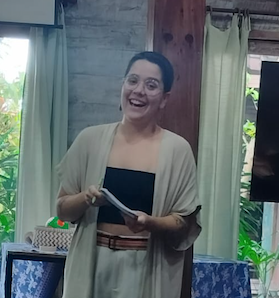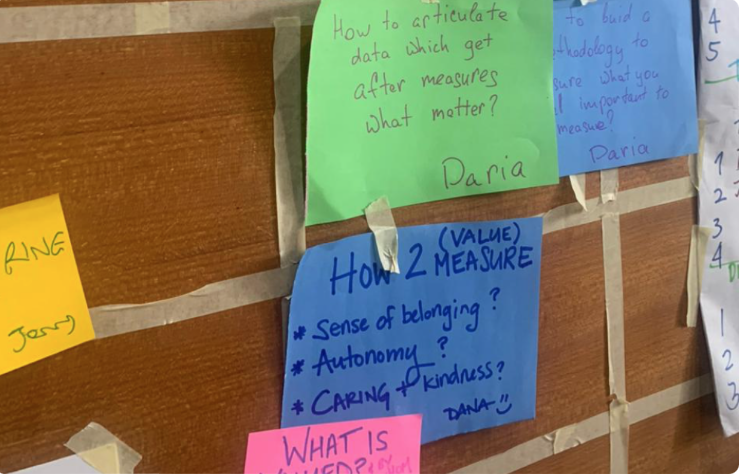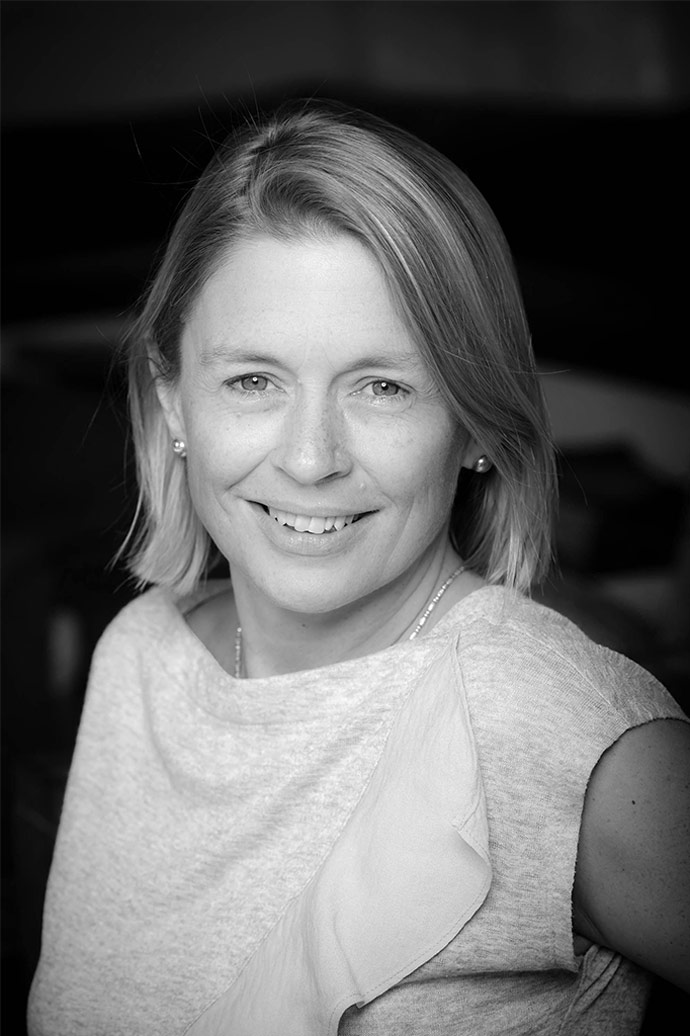Rescuing sense in monitoring and evaluation systems – a perspective from Brazil
02 Aug 2024

Yasmin Morais, Rede Comuá
Between 2 – 8 July 2024, I was in Bali, Indonesia, to participate in a meeting of a community of practice on Measuring What Matters, which is also part of the #ShiftThePower Movement. The purpose of the meeting was to deepen the collective reflections of the learning group regarding the current system of Monitoring and Evaluation (M&E), and to begin to elevate alternative practices. Our conversations covered many topics, and elicited different emotions, doubts and hopes. Here, I want to draw particular attention to one of the themes that emerged which is central to any understanding of what we mean by “measuring what matters.” That is the subjectivity that we all carry with us, which influences the way we relate to and communicate about our practice.
Traditional measurement systems encourage us to set aside subjectivities. Instead of incorporating them into our evaluation processes, we must cast them off, in favour of cold, solely rational and linear processes. This often involves simplifying our stories to make them “fit” into numbers, which, in turn, serve goals that are not even ours. In this way, a gap emerges between what is expected by funders and the way we see the transformation we are fostering in our communities. Can the feeling of collective trust or belonging be measured by metrics that are not ours? Can we capture genuine connections through imported definitions? Can a revolution be inserted into short, medium and long-term indicators?
At Rede Comuá, we have reassessed our measurement systems to best align them with the principles of Measuring What Matters. We realize that this practice expands our vision of the transformation we are seeking, in addition to naming processes that we have been practicing for a long time and encouraging our peers to do the same. Talking to participants in the current class of the Saberes Programme (a fellowship programme), for example, we noticed how they emphasized the notion of “belonging” to the field of community philanthropy and social justice. This had not been a common sentiment among most of the participants before they joined the programme, and it does not easily fit in the quantitative kinds of metrics that we usually monitor. Similarly, when we re-evaluated the way we measure the engagement of members in our network, we realized that the processes of building a collective voice, which is so important for cohesion between members of the Network and for our collective advocacy, could be more explicitly included in our evaluation practices. We also noticed that, rather than measuring the number of meetings, appearances, mentions, reach, etc., we can’t lose sight of the meaning of it all: what motivations, feelings, intentions, changes etc., do these metrics seek to bring about? If they are not sufficient, what alternatives do we have to create measurement processes that reflect who we are, what we feel and what we do?

What “matters” when it comes to measurement, therefore, is what is truly meaningful for those involved in the process of collection, interpretation and communication of the information that they collect and analyze. In Portuguese, “sentido” carries multiple meanings: sensing (feeling) as both direction and meaning. Firstly, “direction” has to do with the journey of each community and the transformation it wants to bring about. Reflecting on one’s own work should be able to give it direction. From what we see now, where do we want to go? Is the path we are on bringing us closer to what we want for our community? What is missing in order to see this horizon more clearly?
Secondly, the term “sentido” relates to the concept of sentipensar, which was popularized by Fals Borda (1987). Drawing on the experiences of Colombian fishing communities, it describes form of knowledge that integrates both reason and emotions, recognizing the importance of lived experiences, feelings and social relations in the construction of knowledge and decision-making. Quite literally, it is “to think with the heart and feel with the head,” integrating critical reflection and emotional experience, and recognizing that our actions and decisions are influenced not only by cold logic, but also by our personal experience and the emotions we experience. By applying sentipensar in our measurement processes, we are recognizing that social and community transformations cannot be reduced to simple quantitative indicators, but should include a deeper understanding of human relationships, cultural values and power dynamics that shape people’s experiences. It is an invitation to a more sensitive and empathetic evaluation, which truly reflects the richness and diversity of human experiences involved in the processes of social and community transformation.
As I deepen my own reflections and put them into other words, I share here a poem that I wrote as a result of my musings.
Sense
We flatten our stories
To fit the metrics
On the lines
In the times
In the tables
That’s so logical
They lose their color
And it’s so cold
They lose their meaning
They lose their feelings
Who does it matter to?
When our courage
It doesn’t fit in these rules
Our construction
There’s another rhythm
Our revolution
It doesn’t fulfill steps
It doesn’t end with the fiscal year
Let’s take care of the spreadsheets!
We redo them
Let’s transform them
Sentipensemos!
I transform myself as I observe
I’m part of the transformation I report
How can I not see who I listen to?
I become a mirror
I admit that I mix
I admit that I’m affected
I mix my colors with yours
My doubts and anxieties
With the hopes we planted
The pains and the struggles
And the result
It’s not a number
And not a single story
It doesn’t fit in reports
And not even in the same time
It’s the past, it’s present and it’s the future
The result
It’s unfinished
Inconstant
Inappropriate
It’s sense
What pulses?
And that guides us
Closer to us
By: Yasmin Morais, Programme Advisor at Rede Comuá. This blog was first published by Rede Comuá.
Sources:
Fals Borda y Rodríguez Brandao C. (1987) Participatory Research. Montevideo: La Oriental Band

